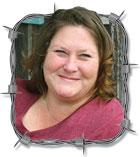In the 60's and 70's, you could come to a crossroad café in places like Cave Springs, Elkins or Hindsville, come inside the screen door and ask, "Where can I buy some feeder pigs?"
And folks would tell you plenty of people around there who had weaner shoats for sale. It was no problem to find a load to fill your double-decker pickup with a modified Lowell rack full, in a few hours.
Pigs came with the first pioneers to the Ozarks. They used to call them “mortgage lifters,” meaning that an old sow could produce enough piglets to furnish you the cash you needed, or you could barter and trade with them. They could survive in the hardwoods, produce litters and then when it was late summer, pigs were selected to put up in log traps and they were fed corn for a period of time to supply meat for the winter.
Some of them escaped both catch dogs and man to become the fabled “razorbacks.” Pigs are the only animal that in three generations, turned loose in the wild they go feral. Belted Hampshire hogs by the third generation will be rusty brown or black without a trace of the white belt.
Of course, killing time usually came around Halloween. In those days it was usually at that time few had a frost and the carcass could be hung out overnight to chill. Killing a hog at any other time of year but then or the dead of winter drew great gasps of shock from the natives. I can recall in the early 60’s when my partner, Monty Smith, and I went to town and bought some sausage seasoning and some bacon cure in July.
Folks really worried about us dumb cowboys. No one killed hogs in July. Grown men in the store looked appalled. Why a hog killed in July would poison you or worse yet all the meat would sure spoil just over night. Dumbest thing I’d ever heard. So we went home butchered him, sawed him in half and cooled him over night in our large chest freezer. Then the next day we cut and wrapped him.
The sausage mill was borrowed from my in-laws. One big guy in the family sat on the chair and fed the thing while the other turned the crank which took lots of muscle. I was in on several butcherings, and the job of making ground meat, beef or pork was an arm-wrenching adventure and lasted all day. In fact I wrote my mother in Arizona to see if the grinder on her large model Mix Master would grind meat. She wrote back no, she’d tried it — you needed a commercial meat grinder. Later, with this on my mind when I was in an early Wal-Mart, I found a professional meat grinder for less than $30. I bought it for my father-in-law for Christmas. He opened his Christmas present and looked with great doubt that this small electric grinder would suit his needs. In fact he planned to butcher a steer shortly.
I arrived on the scene that Friday evening. He had all his knives sharpened and a meat saw ready. Also that clamp-on grinder was screwed down tight on a ladder-back kitchen chair. I went and found the new box in the cabinet and put the green machine out.
“Yeah sure we can use it,” he said. But I heard the doubt in his voice.
My wife’s sister Karen who was no weakling, said, “If not, you and I can run that thing tomorrow.” She meant the hand-cranked one.
Even I began to look forward to the next morning filled with dread when we’d cut up old “Billy-Boy” or “Tom Jack.” We always named them, so the kids would make faces eating a hamburger. “Is this really him?” they'd ask.
Well, the cut-up operation was going fine. The ones trimming fat were also making cuts to wrap and freeze. They soon had a wash pan of meat to grind. I plugged in the new grinder. It didn’t sound powerful when I flipped the switch. Pan in place to catch the results, I tossed in some beef, and, bingo. With a small grunt, out came the Big Mac material.
Shocked, we all looked at that wonderful machine and began singing a song in relief. We ground beef all morning without a hiccup. And that grinder worked for years for several of our families. I don’t know where that old hand grinder is now, but I’ve sure never missed it.
Western novelist Dusty Richards and his wife Pat live on Beaver Lake in northwest Arkansas. For more information about his books you can email Dusty by visiting www.ozarksfn.com and clicking on 'Contact Us' or call 1-866-532-1960.






